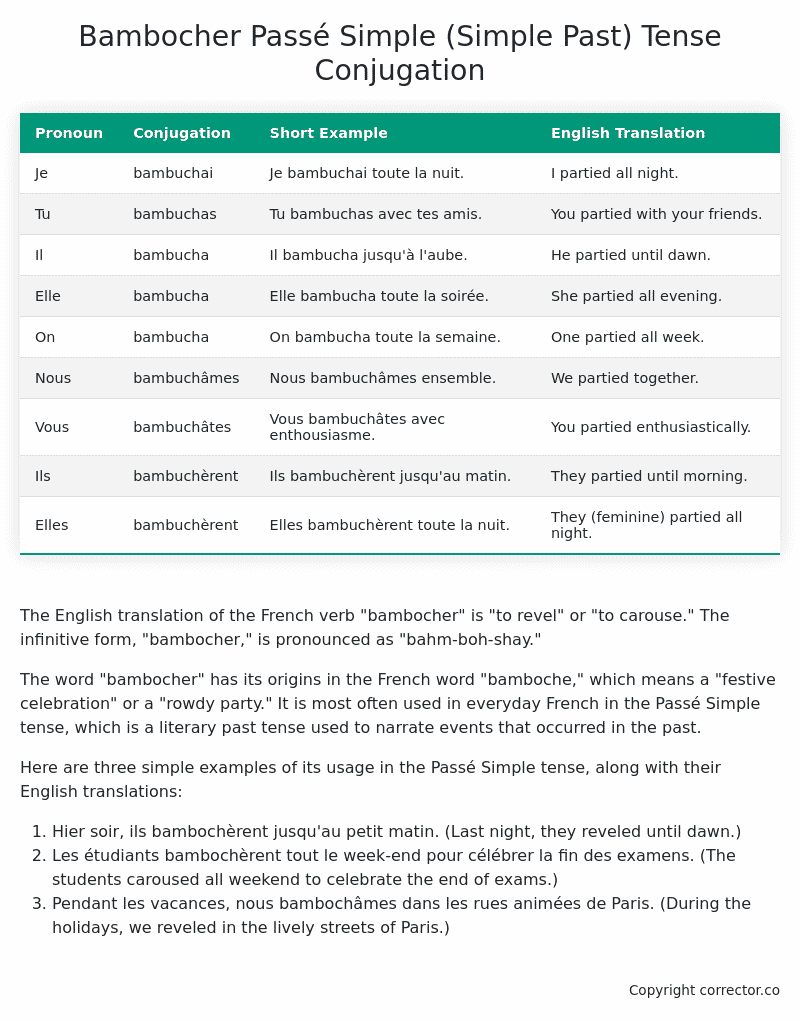Passé Simple (Simple Past) Tense Conjugation of the French Verb bambocher
Introduction to the verb bambocher
The English translation of the French verb “bambocher” is “to revel” or “to carouse.” The infinitive form, “bambocher,” is pronounced as “bahm-boh-shay.”
The word “bambocher” has its origins in the French word “bamboche,” which means a “festive celebration” or a “rowdy party.” It is most often used in everyday French in the Passé Simple tense, which is a literary past tense used to narrate events that occurred in the past.
Here are three simple examples of its usage in the Passé Simple tense, along with their English translations:
- Hier soir, ils bambochèrent jusqu’au petit matin. (Last night, they reveled until dawn.)
- Les étudiants bambochèrent tout le week-end pour célébrer la fin des examens. (The students caroused all weekend to celebrate the end of exams.)
- Pendant les vacances, nous bambochâmes dans les rues animées de Paris. (During the holidays, we reveled in the lively streets of Paris.)
Table of the Passé Simple (Simple Past) Tense Conjugation of bambocher
| Pronoun | Conjugation | Short Example | English Translation |
|---|---|---|---|
| Je | bambuchai | Je bambuchai toute la nuit. | I partied all night. |
| Tu | bambuchas | Tu bambuchas avec tes amis. | You partied with your friends. |
| Il | bambucha | Il bambucha jusqu’à l’aube. | He partied until dawn. |
| Elle | bambucha | Elle bambucha toute la soirée. | She partied all evening. |
| On | bambucha | On bambucha toute la semaine. | One partied all week. |
| Nous | bambuchâmes | Nous bambuchâmes ensemble. | We partied together. |
| Vous | bambuchâtes | Vous bambuchâtes avec enthousiasme. | You partied enthusiastically. |
| Ils | bambuchèrent | Ils bambuchèrent jusqu’au matin. | They partied until morning. |
| Elles | bambuchèrent | Elles bambuchèrent toute la nuit. | They (feminine) partied all night. |
Other Conjugations for Bambocher.
Le Present (Present Tense) Conjugation of the French Verb bambocher
Imparfait (Imperfect) Tense Conjugation of the French Verb bambocher
Passé Simple (Simple Past) Tense Conjugation of the French Verb bambocher (You’re reading it right now!)
Passé Composé (Present Perfect) Tense Conjugation of the French Verb bambocher
Futur Simple (Simple Future) Tense Conjugation of the French Verb bambocher
Futur Proche (Near Future) Tense Conjugation of the French Verb bambocher
Plus-que-parfait (Pluperfect) Tense Conjugation of the French Verb bambocher
Passé Antérieur (Past Anterior) Tense Conjugation of the French Verb bambocher
Futur Antérieur (Future Anterior) Tense Conjugation of the French Verb bambocher
Subjonctif Présent (Subjunctive Present) Tense Conjugation of the French Verb bambocher
Subjonctif Passé (Subjunctive Past) Tense Conjugation of the French Verb bambocher
Subjonctif Imparfait (Subjunctive Imperfect) Tense Conjugation of the French Verb bambocher
Subjonctif Plus-que-parfait (Subjunctive Pluperfect) Tense Conjugation of the French Verb bambocher
Conditionnel Présent (Conditional Present) Tense Conjugation of the French Verb bambocher
Conditionnel Passé (Conditional Past) Tense Conjugation of the French Verb bambocher
Conditionnel Passé II (Conditional Past II) Tense Conjugation of the French Verb bambocher
L’impératif Présent (Imperative Present) Tense Conjugation of the French Verb bambocher
L’impératif Passé (Imperative Past) Tense Conjugation of the French Verb bambocher
L’infinitif Présent (Infinitive Present) Tense Conjugation of the French Verb bambocher
L’infinitif Passé (Infinitive Past) Tense Conjugation of the French Verb bambocher
Le Participe Présent (Present Participle) Tense Conjugation of the French Verb bambocher
Le Participe Passé (Past Participle) Tense Conjugation of the French Verb bambocher
Struggling with French verbs or the language in general? Why not use our free French Grammar Checker – no registration required!
Get a FREE Download Study Sheet of this Conjugation 🔥
Simply right click the image below, click “save image” and get your free reference for the bambocher Passé Simple tense conjugation!

Bambocher – About the French Passé Simple (Simple Past) Tense
Formation
Usage
Narration
Historical Context
Interactions with other tenses
Passé Composé
Imparfait
Conditional and Subjunctive
Summary
I hope you enjoyed this article on the verb bambocher. Still in a learning mood? Check out another TOTALLY random French verb conjugation!


